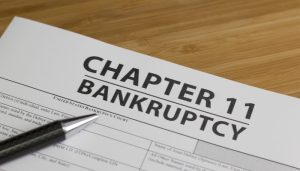Home » Posts tagged 'Chapter 11 Bankruptcy'
Tag Archives: Chapter 11 Bankruptcy
What is Chapter 11 Bankruptcy and Should You File for It?

Do you want to know what Chapter 11 bankruptcy is? Many people don’t have a clear idea about this debt reorganization strategy. Should you file for it if you’re in financial trouble? If you make efforts to study Chapter 11 of the United States Bankruptcy Code, you will get the best answers to these questions. Let us explore the pros and cons of Chapter 11 bankruptcy.
Chapter 11 Bankruptcy – An overview
Named after Chapter 11 of the United States Bankruptcy Code, it is a form of bankruptcy that allows businesses and individuals to reorganize debts, assets, and business affairs. Though it is open to all types of businesses, including sole proprietorship, corporation, partnership, and also to individuals; corporate establishments are the most prominent ones to make use of this bankruptcy option.
Should you opt for Chapter 11?
Should you file for Chapter 11 bankruptcy if you’re in financial trouble? To answer this question properly, you need to check the pros and cons of this reorganization bankruptcy. It involves many more complexities than other bankruptcy cases. Further, it stands taller in terms of expenses involved. That is to say, Chapter 11 is the most expensive form of a bankruptcy proceeding.
What do these aspects indicate?
You must carefully consider all options available before choosing this one. Smart business owners always analyze things deeply and find out Chapter 11 is the best among all other possible alternatives.
Two conditions make a company/individual eligible to file a Chapter 11 case. If your business liabilities are higher compared to assets, you can file a Chapter 11 case. Your case must be substantiated with a balance sheet test. If your business cannot pay off its debts as they come due, you can file a case for bankruptcy under Chapter 11 code. An income statement test should be used to make your arguments logical and convincing.

Let us check the pros of Chapter 11 bankruptcy;
1. Chapter 11 helps you restructure the debts and other liabilities
When you file for this type of bankruptcy, you will get ample time to reorganize the debt. During the proceeding, the court assists your business in restructuring the debts and obligations. Critically, this bankruptcy version offers you a fresh start. You get some breathing time and space to reorganize all affairs systematically. The terms and conditions are determined based on your fulfillment of the liabilities under the reorganization plan.
2. Your business stays open
Most of the businesses remain open and stay functional even after filing for Chapter 11 bankruptcy. It is one of the most prominent advantages of this bankruptcy plan. Several large U.S. companies file for this reorganization plan and continue their operations to ensure speedy revival.
3. Minimal intervention from the court under normal circumstances
In most cases, the court allows the debtor to run the business as usual. A trusty is appointed only when the court finds any mismanagement, incompetence, dishonesty, or fraudulent practice. So, you can expect minimal intervention while running your business during a crisis. The only restriction is that you need to get permission from the court while making critical decisions.
4. Fast acceptance for a feasible reorganization plan
As an individual or business, you get an opportunity to propose a reorganization plan under Chapter 11. If you submit a feasible restructuring plan, you can expect fast approval. A good plan always includes the best strategies for:
– Downsizing of business operations to lower expenses
– Renegotiating of current debts
– Liquidating all assets to repay creditors
If your method of approach is sensible and practical, the court gives a fast approval. You can move forward with confidence to tackle the challenges and recover fast.
5. Safeguards the interests of all stakeholders
The bankruptcy court approves only a proposal that safeguards the interests of the creditors. As a debtor in possession, you need to come up with a reorganization plan that accommodates the needs and interests of all stakeholders. If the debtor cannot design a program, the court asks the creditors to submit a plan.
All stakeholders, including shareholders and creditors, have the right to support or oppose your plan and other suggestions that need bankruptcy court approval. After assessing their feedback and suggestions, the bankruptcy court decides the course of action.
With the help of a special committee, unsecured creditors are allowed to participate in the Chapter 11 case. The constituted committee can hire attorneys and other professionals for the necessary guidance and support. The debtor needs to pay these expenses.
6. Flexible terms and conditions
You need to propose a restructuring plan within four months of filing a Chapter 11 case. The date for plan submission (exclusivity period) can be extended up to 18 months if you convince the court with a genuine reason.
After the completion of the exclusivity period, the creditors and shareholders can submit their competing reorganization plans. These people can move to the bankruptcy court to dismiss the restructuring plan if they are not satisfied with the steps taken by the debtor. In such a situation, the court dismisses the case or converts it to Chapter 7.
Some Chapter 11 cases may end within a few months. Complex cases always need more time for the final settlement. Generally speaking, a Chapter 11 bankruptcy case is settled between 6 months and 2 years.
7. Businesses can emerge as stronger from Chapter 11 bankruptcy
If you develop a concrete restructuring plan and follow it with uncompromising discipline, your company can emerge as a stronger business. It is a time for reflection and to learn about the mistakes. You need to evaluate your mistakes and develop a Chapter 11 plan that takes care of the needs of all stakeholders. This method of approach helps you emerge as a winner.
A Chapter 11 plan is a contract between the debtor and creditors and/or shareholders. This contract clearly shows how your business operates and pays its liabilities or obligations in the future. You can seek professional help to design a well-thought-out plan. Experienced Chapter 11 financial advisors teach you how to reorganize your business to solve the current crisis and deal with future challenges with improved efficiency.

Cons
1. Chapter 11 bankruptcy is the most complex plan available
Chapter 11 is the most complex of all bankruptcy plans available. If you don’t have a clear plan, you may end up facing many more challenges and complexities. So, you need to check all other options carefully before making a decision.
2. Making major business decisions need permission from the court
One of the difficulties is that you need to seek permission from the court to make major business decisions. Bankruptcy court permission is needed for:
– Sale of assets except for inventory
– Starting or closing a lease or rental agreement on personal or real property
– Expending or closing down business operations
– Mortgaging or securing other types of loans or borrowings
– Making decisions on retaining and paying attorneys
– Signing up new contracts or modifying the existing ones with unions and vendors
Though the debtor stays in charge of the business after filing Chapter 11, he/she needs permission from the bankruptcy court to make critical decisions.
3. Confirmation of a proposed Chapter 11 plan is not easy
Several factors influence the confirmation of a proposed Chapter 11 plan. It is not easy to get your plan approved. Your plan needs to fulfill several requirements. The approval of your plan is known as confirmation. After assessing all relevant factors, the bankruptcy court takes the final decision. It can be a daunting task even for qualified business professionals.
4. Chapter 11 is highly expensive
Chapter 11 bankruptcy involves high reporting and oversight expenses. Further, the debtor has to spend more money on procedure-related tasks. Extensive procedural requirements demand professional expertise, especially legal work on behalf of several parties, including the debtor, creditors, and shareholders. All these aspects make this type of bankruptcy highly expensive.
So, you have a clear idea about the pros and cons of Chapter 11 bankruptcy. Now, let us explore the most important factors that make a powerful impact on the approval of a Chapter 11 plan.
Feasibility is a vital factor
The feasibility of your proposed plan is critical. The court checks the feasibility carefully before granting approval. The debtor has to prove that the proposal is good enough to raise the expected revenues during the plan term to cover all debts and other types of expenses.
Good Faith
Being a debtor in possession, you have to convince the bankruptcy court that the plan has been proposed in good faith. If the court finds any forbidden methods under applicable law, your plan will be rejected.
Creditors’ best interests are highly important
The court accepts your proposed plan if it meets the best interests of the creditors. The test for best interests’ in Chapter 11 demands that creditors have to be repaid as much as they would have received under Chapter 7 liquidation.
The debtor has to pay the debt in full to on certain occasions to meet the best interests’ test. On most occasions, Chapter 11 applicants might be neck-deep in debt. These people can fulfill the best interests’ test requirements by paying creditors a certain percentage of what they actually owe.
Fairness and equitability are extremely significant
You need to submit a fair and equitable Chapter 11 plan to get the confirmation from the court. Certain conditions are being laid out to meet the fair and equitable’ test. The debtor in possession must pay the secured creditors at least the value equivalent to their collateral. Your plan should fair and equitable enough to protect the interests of the secured and unsecured creditors. The fair and equipment test becomes valid only if the creditors vote against your proposal.
Generally speaking, Chapter 11 bankruptcy is a good plan to overcome your debt issues. However, you must convince the court about the recovery plan. Submitting a well-thought-out, feasible, and practical reorganization plan; the debtor in possession can expect fast acceptance from the court. Chapter 11 allows you to keep the business functional while making efforts to deal with the existing debts and other related challenges.
Why should you hire an attorney when you decide to file for Chapter 11 bankruptcy?
Bankruptcy-related legal processes have always been highly confusing and complicated. The debtor in possession has to be knowledgeable about a wide variety of aspects. You should also prepare a perfect plan to convince the bankruptcy court and get the confirmation. That is why you need to hire an experienced attorney who specializes in this area.
Accomplished experts can offer you the best guidance and support and walk you through every step responsibly and efficiently. That is to say, professional help always helps you solve this stressful and complicated process without any hassles.
Proper assessment of your financial situation
Experienced bankruptcy lawyers analyze your finances in detail. These people apply their expertise judiciously to review your existing financial situation before offering the right advice that protects your interests. Moreover, they make you aware of your responsibilities and rights when it comes to filing a Chapter 11 case.
Preparation of an error-free petition
Trusted bankruptcy lawyers explain all regulations that make an impact on your case and guide you through all steps like a trusted companion. Filing a Chapter 11 petition involves strenuous paperwork. These experts make sure that all the necessary information is included and listed in your petition. Preparing an accurate and detailed petition, an attorney makes your life a lot easier.
The best protection from creditors
An experienced bankruptcy attorney can offer you the best protection against the harassment from the creditors. You can learn what creditor behavior is termed as offensive or abusive by the governing rules. This awareness makes you aware of your rights during the Chapter 11 bankruptcy filing process.
So, professional help is inevitable. Seeking professional expertise offers you much-needed peace of mind as a debtor. Under the expert counsel and support of an accomplished attorney, you can make the right decisions and create the best Chapter 11 plan that solves your existing problem efficiently.